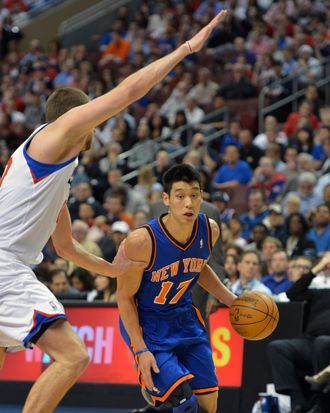
The Knicks have until 11:59 p.m. (though they’re disputing that) to decide whether or not they’d like to match the Houston Rockets’ offer sheet to Jeremy Lin. Doing so would commit the Knicks to paying Lin $25 million over three years, the brunt of which would come in a $14.8 million “poison pill” third year. But if that offer is causing the Knicks such consternation, why isn’t it doing the same for the Rockets? Since we’ve seen a lot of uncertainty around the Internet (and around here) about the specifics of the NBA’s byzantine restricted free agency system, we wrangled Larry Coon — the planet’s preeminent expert on NBA finances, author of the NBA Salary Cap FAQ, and a very busy man this time of year — for a few questions.
Why didn’t the Knicks make Lin an initial offer? If they did make an offer, how big could it have been?
This is the one situation where the incumbent can’t make as large an offer as other teams. For details, look up “Gilbert Arenas provision” in my FAQ. The Rockets (or another team with sufficient cap room) could offer Lin a three- or four-year contract with a big raise starting in the third year. The Knicks could only offer 7.5 percent raises.
And what about other teams like the Rockets? How much could they have offered and are the rules different for their offers?
Per the Gilbert Arenas provision, the third year could be as much as it could have been had they signed him with all their cap room and given him 4.5 percent raises had the Gilbert Arenas provision not existed.
If Lin’s “Bird rights” restrict how the Knicks can pay him, then are they even a good thing? Why not just let him become an unrestricted free agent?
Lin’s Bird rights (actually, the two-year version called Early Bird) allowed them to pay up to the average salary. Without those Bird rights, the Knicks would have had to use their mid-level exception to pay him, and could not give him more than he could have made with Bird rights (and only could have come close if they accepted a hard cap at $74.3 million). In addition, if Lin was an unrestricted free agent, he could have signed with any other team and the Knicks wouldn’t have been able to do anything about it.
Why did the Rockets include the “poison pill” in Lin’s contract, since they’ll have to pay it if the Knicks don’t match?
To make it harder on the Knicks, in the hopes that they won’t match. In addition, there are two reasons that it won’t be as tough on the Rockets as
it will be on the Knicks: (1) The Rockets will have a much lower team salary, and therefore will pay much less tax (or maybe no tax at all); (2) for a contract per the Gilbert Arenas provision, the Rockets team salary would reflect the average salary in the contract in all three seasons, rather than
the full $14.8 million in the third season.
Doesn’t allowing a “poison pill” scenario dissuade teams from retaining their own players? What is the rationale behind this rule?
Yes. Without the Arenas provision, teams with sufficient cap room could sign players to offer sheets their prior teams can’t match. The Arenas provision restricts the first year of the offer to the mid-level amount, to guarantee the team can match with Early Bird rights or their Mid-Level exception. So from that perspective, it promotes teams’ ability to retain their players.
But the players obviously didn’t want their salaries restricted like that, so they added the big raise starting in the third year. This way, the players could still get a big contract like they would have gotten if the Arenas provision didn’t exist, and these players will get a big payday about the same time that a first-round pick would be able to get one.
The unintended consequence was to create the poison pill offer that the Rockets & Raptors have taken advantage of.
What’s this about luxury tax? Why does retaining Lin mean the Knicks lose more than just his salary?
A taxpaying team pays an extra dollar of tax for each dollar they are above the tax line. Starting next season, the rates go up, and get progressively worse for each $5 million the team is over the tax line. See the luxury tax question in my FAQ for the rates.
*
So, what did we learn? It seems that the Knicks didn’t make Lin an initial offer because they knew they couldn’t pay him full market value (there is some speculation that Lin would have accepted New York’s maximum initial offer, but that, again, would mean settling for a smaller paycheck). The back-loaded “poison pill” issue only affects the Knicks, while the Rockets can distribute Lin’s salary over the life of the contract. Meanwhile, if New York hadn’t earned Lin’s Bird rights in that union court case, they likely wouldn’t even have a chance of retaining him right now.
Hopefully this clears up some uncertainties. New York has until midnight (unless their dispute holds any weight, which it almost certainly does not) to figure all this out and make a decision.